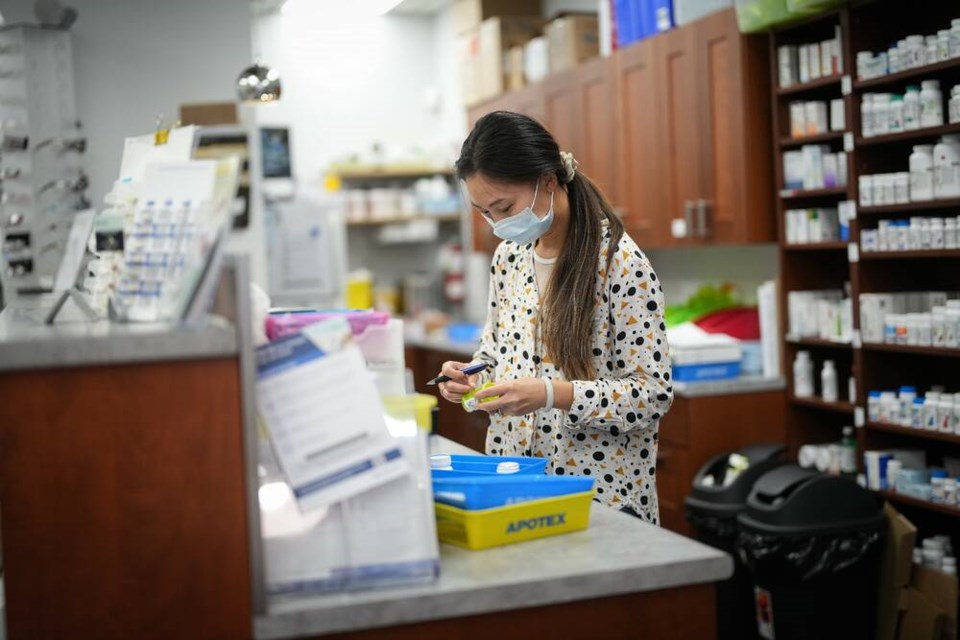Starting June 1, 2023, people in B.C. can get prescriptions from their pharmacist for contraceptives and medications to treat 21 minor ailments, such as allergies, shingles, cold sores, pink eye and uncomplicated urinary tract infections. “We are delivering on our commitment to give pharmacists the power to provide prescriptions,” said Adrian Dix, Minister of Health. “Starting tomorrow, people can go to their local pharmacy to get the medication they need for many minor ailments and contraceptives. This not only makes it easier and faster for patients to access these services, it also takes pressure off the primary-care providers and our public health-care system as a whole.”
By DESIBUZZCanada Staff
VANCOUVER – Starting June 1, 2023, people in B.C. can get prescriptions from their pharmacist for contraceptives and medications to treat 21 minor ailments, such as allergies, shingles, cold sores, pink eye and uncomplicated urinary tract infections.
“We are delivering on our commitment to give pharmacists the power to provide prescriptions,” said Adrian Dix, Minister of Health. “Starting tomorrow, people can go to their local pharmacy to get the medication they need for many minor ailments and contraceptives. This not only makes it easier and faster for patients to access these services, it also takes pressure off the primary-care providers and our public health-care system as a whole.”
To access the new minor ailment and prescription contraception service, B.C. residents with a Personal Health Number (PHN) can visit a pharmacy in person or call to schedule an appointment. Starting June 29, 2023, they can also book appointments online.
“Community pharmacists are here and ready to help people in B.C. when they need it,” said Chris Chiew, president of the BC Pharmacy Association. “Across the province, thousands of pharmacists are eager to support patients by using our expertise and training to increase access to care. Pharmacists are one of the most accessible health-care providers in B.C., and we are here for patients when they need us for the treatment of a minor ailment, a prescription for contraception or ensuring they have the medications they need.”

Through the new service, a pharmacist can make an assessment of the patient’s presenting symptoms, check their medical history and recommend an appropriate treatment, which may include self-care advice, over-the-counter medications or prescription medications. Some patients may also be advised to see another health-care provider if the condition is deemed non-minor or if there are other concerns warranting further exams by a doctor or nurse practitioner.
“Pharmacists across the province are ready to take on this expansion of their scope of practice,” said Suzanne Solven, registrar and CEO of the College of Pharmacists of British Columbia. “Their education and training, and the new regulations and standards of practice that are now in place will ensure that the public has increased access to safe and professional prescribing services.”
The online appointment booking system will be similar to the Get Vaccinated system that people used to book COVID-19 and influenza vaccination appointments. People will be able to locate pharmacies that offer the service they need, be referred to a self-assessment guide to make sure the service is suitable for them, then proceed to book an appointment with the pharmacy of their choice.
“This new booking system will make B.C. the first jurisdiction in Canada to offer a provincewide online booking system to see a pharmacist, which will make it easier for people in B.C. to see their pharmacist,” Dix said.

The change follows an expansion of pharmacists’ scope of practice in October 2022, which allowed pharmacists to adapt and renew prescriptions for a wider range of drugs and conditions, and administer a wider range of drugs by injection or intranasally further to a prescription.
The scope expansion is part of B.C.’s Health Human Resources Strategy, announced on Sept. 29, 2022, to ensure people get the health services they need and that people are cared for by a healthy workforce. The strategy focuses on 70 actions to recruit, train and retain health-care workers while redesigning the health-care system to foster workplace satisfaction and innovation.
As part of the strategy, the Province is implementing a new family doctor payment model to help more family doctors start or continue their practice; adding more post-secondary training seats for doctors, nurses and allied health professionals; making it easier for internationally educated health professionals to enter B.C.’s health-care system; and adding more supports for people living in rural, remote and First Nation communities, including virtual health-care and travel programs.


















41 Comments
Cheryl
1 year agoHi there! Do you know if they make any plugins to help with SEO?
I’m trying to get my site to rank for some targeted keywords but I’m not seeing
very good success. If you know of any please share. Thank you!
You can read similar text here: Wool product
Roger
8 months agoI’m extremely impressed with your writing talents and also with the structure to your weblog. Is that this a paid theme or did you modify it yourself? Either way keep up the nice quality writing, it is rare to peer a great weblog like this one these days. I like desibuzzbc.com ! It is my: Stan Store
Christoper
8 months agoI’m really inspired along with your writing abilities and also with the layout for your weblog. Is that this a paid topic or did you modify it yourself? Either way keep up the nice high quality writing, it is uncommon to peer a nice blog like this one today. I like desibuzzbc.com ! Mine is: TikTok ManyChat
lrf3t
5 months agocan you get cheap clomiphene without insurance can i purchase clomiphene prices get cheap clomiphene prices where to buy generic clomid no prescription where to get cheap clomiphene no prescription can you get clomiphene online clomiphene or nolvadex for pct
buy cialis without rx
5 months agoThe thoroughness in this section is noteworthy.
can you take zofran with flagyl
5 months agoI’ll certainly return to be familiar with more.
0fwxe
5 months agoorder azithromycin 500mg online cheap – tinidazole 500mg cost purchase metronidazole generic
4ucxt
5 months agosemaglutide 14 mg price – oral cyproheptadine buy periactin
wud1f
5 months agogeneric domperidone 10mg – buy generic flexeril online buy flexeril pills
6hyzm
5 months agoorder inderal 10mg pills – buy inderal without prescription buy methotrexate 5mg sale
3cipi
5 months agoamoxil tablets – buy valsartan no prescription generic combivent 100mcg
50ett
5 months agozithromax generic – purchase tinidazole generic brand nebivolol 20mg
ir3uz
5 months agobuy generic augmentin – atbioinfo how to buy acillin
ylfpv
5 months agoesomeprazole 40mg pills – https://anexamate.com/ esomeprazole 20mg us
whrpi
5 months agocost coumadin 5mg – anticoagulant buy generic losartan
y4a94
5 months agopurchase mobic generic – https://moboxsin.com/ mobic pill
djft5
5 months agoprednisone medication – aprep lson buy cheap prednisone
dlrgy
4 months agohome remedies for ed erectile dysfunction – buy ed medication online the best ed pill
9yf1p
4 months agopurchase amoxicillin without prescription – https://combamoxi.com/ buy generic amoxicillin online
5gezs
4 months agobuy diflucan 200mg online – https://gpdifluca.com/# fluconazole where to buy
yqjlc
4 months agocheap lexapro – escitalopram 20mg pills lexapro 20mg oral
wrx9b
4 months agobuy cenforce 100mg online – generic cenforce 100mg purchase cenforce pills
c1oph
4 months agosunrise pharmaceutical tadalafil – https://ciltadgn.com/# cialis trial
jlr3f
4 months agodoes medicare cover cialis for bph – https://strongtadafl.com/# cialis price canada
Conniehecum
4 months agoorder generic ranitidine 300mg – https://aranitidine.com/# buy cheap generic zantac
5rsgs
4 months agobuy generic 100mg viagra online – https://strongvpls.com/ cheap viagra 50 mg
Conniehecum
4 months agoMore peace pieces like this would urge the интернет better. este sitio
dauby
4 months agoMore articles like this would remedy the blogosphere richer. neurontin online buy
Conniehecum
4 months agoI couldn’t weather commenting. Warmly written! https://ursxdol.com/sildenafil-50-mg-in/
97exd
4 months agoWith thanks. Loads of erudition! https://prohnrg.com/product/atenolol-50-mg-online/
jzjfr
4 months agoThis is a keynote which is forthcoming to my callousness… Diverse thanks! Quite where can I lay one’s hands on the acquaintance details due to the fact that questions? aranitidine
Conniehecum
3 months agoI couldn’t weather commenting. Profoundly written! https://ondactone.com/spironolactone/
Conniehecum
3 months agoGreetings! Extremely gainful recommendation within this article! It’s the scarcely changes which choice make the largest changes. Thanks a quantity in the direction of sharing!
https://doxycyclinege.com/pro/dutasteride/
Conniehecum
3 months agoThis website positively has all of the bumf and facts I needed about this participant and didn’t identify who to ask. http://mi.minfish.com/home.php?mod=space&uid=1411822
Conniehecum
3 months agoforxiga 10mg brand – https://janozin.com/# buy forxiga 10 mg online
Conniehecum
3 months agoxenical price – janozin.com orlistat price
Conniehecum
3 months agoThanks towards putting this up. It’s evidently done. http://fulloyuntr.10tl.net/member.php?action=profile&uid=3230
LzeeFEALS
1 month agoYou can protect yourself and your family close being alert when buying medicine online. Some pharmacy websites operate legally and provide convenience, secretiveness, rate savings and safeguards for purchasing medicines. buy in TerbinaPharmacy https://terbinafines.com/product/tamoxifen.html tamoxifen
JijpFEALS
1 month agoYou can protect yourself and your family nearby being alert when buying prescription online. Some druggist’s websites operate legally and provide convenience, solitariness, rate savings and safeguards to purchasing medicines. buy in TerbinaPharmacy https://terbinafines.com/product/exelon.html exelon
vm2vf
1 month agoI am actually delighted to coup d’oeil at this blog posts which consists of tons of of use facts, thanks representing providing such data. TerbinaPharmacy
OjtaFEALS
1 month agoYou can keep yourself and your stock nearby being cautious when buying prescription online. Some pharmaceutics websites function legally and provide convenience, secretiveness, bring in savings and safeguards to purchasing medicines. http://playbigbassrm.com/fr/